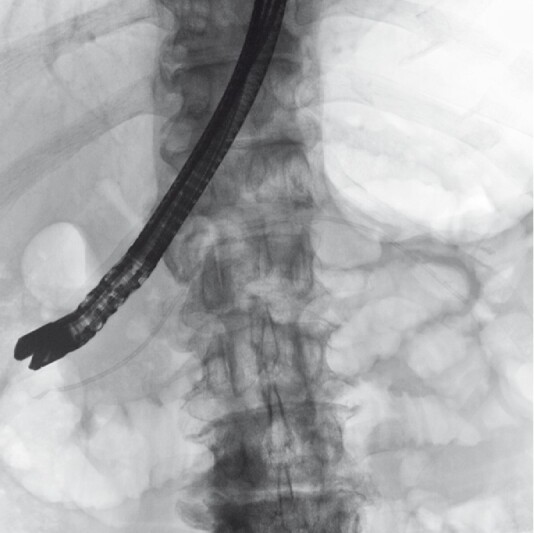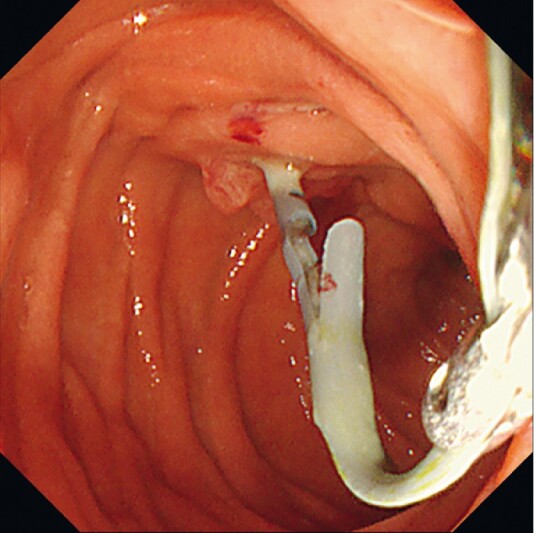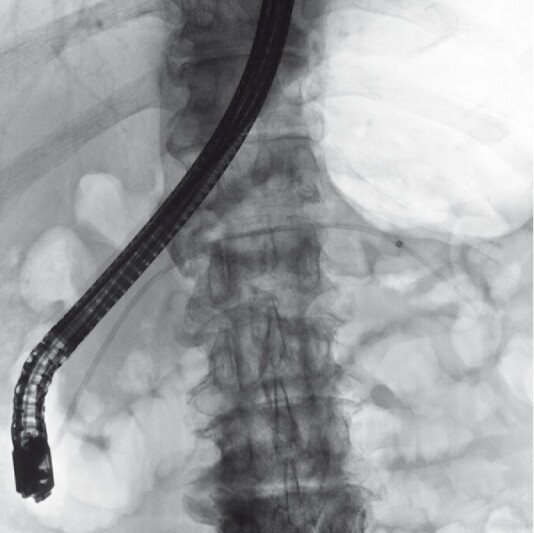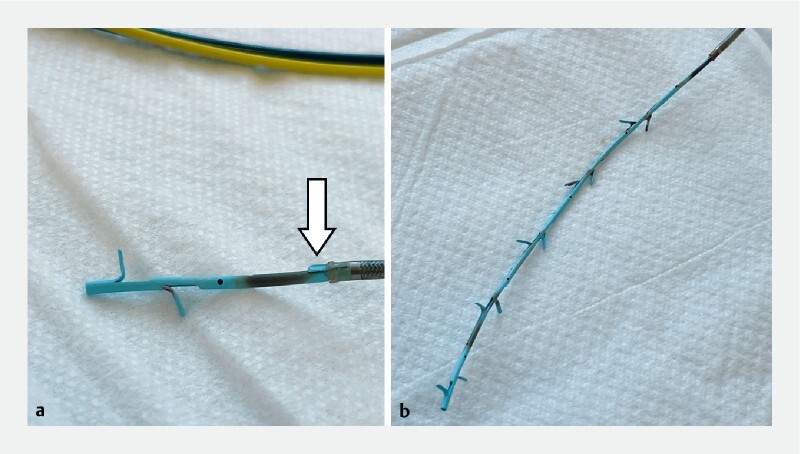Endoscopic pancreatic duct stenting is used for a variety of conditions. Although numerous reports have described pancreatic stent migration 1 , few have detailed the proximal flaps getting stuck in the pancreatic duct 2 . Here, we report a novel technique for endoscopic removal of a pancreatic stent that can be used when its flaps become stuck in the pancreatic duct.
A 73-year-old man who had undergone endoscopic pancreatic drainage 9 months previously for a malignant pancreatic duct stricture using a 5-Fr stent with 10 proximal flaps presented with obstructive pancreatitis. The initial attempt at endoscopic removal of the stent failed because the proximal flaps became stuck, and the distal portion of the stent was torn off. He was therefore referred for endoscopic removal of the stent stuck in the pancreatic duct ( Fig. 1 ).
Fig. 1.

Fluoroscopic image showing a 5-Fr stent with 10 proximal flaps stuck in the pancreatic duct.
To treat this patient, we developed a novel removal technique, named the “retracting flaps” technique, that uses a device delivery system (EndoSheather; Piolax Medical Devices, Kanagawa, Japan). Biopsy forceps with a 1.8-mm diameter (Cospa; Century Medical, Tokyo, Japan) were inserted through the system’s outer sheath (6.2-Fr inner diameter). While grasping and pulling the distal end of the stent with the forceps ( Fig. 2 ), we advanced the outer sheath over the stent and retracted the flaps within the sheath ( Fig. 3 ). Finally, while still retracting the flaps, we were able to retrieve the stent from the pancreatic duct ( Fig. 4 , Video 1 ). A 7-Fr stent was subsequently placed, and the patient was discharged without further complications.
Fig. 2.

Endoscopic image of the pancreatic stent, the distal end of which was grasped using biopsy forceps.
Fig. 3.

Fluoroscopic image showing the outer sheath of the device delivery system being advanced over the stent.
Fig. 4.

Photographs showing: a a stent flap retracted within the outer sheath (arrow); b the retrieved stent whose flaps were folded in the opposite direction.
Video 1 Application of the novel “retracting flaps” technique using a device delivery system for endoscopic removal of a pancreatic stent with 10 proximal flaps from the pancreatic duct.
Forcibly pulling a stuck pancreatic stent carries a high risk of triggering intraductal stent fragmentation, which makes retrieval of the fragmented stent technically more difficult 3 . The “retracting flaps” technique is easy to perform and enables safe stent removal.
Endoscopy_UCTN_Code_CPL_1AK_2AD
Footnotes
Competing interests The authors declare that they have no conflict of interest.
Endoscopy E-Videos : https://eref.thieme.de/e-videos .
Endoscopy E-Videos is an open access online section, reporting on interesting cases and new techniques in gastroenterological endoscopy. All papers include a high quality video and all contributions are freely accessible online. Processing charges apply, discounts and wavers acc. to HINARI are available. This section has its own submission website at https://mc.manuscriptcentral.com/e-videos
References
- 1.Matsumoto K, Katanuma A, Maguchi H. Endoscopic removal technique of migrated pancreatic plastic stents. J Hepatobiliary Pancreat Sci. 2014;21:E34–E40. doi: 10.1002/jhbp.94. [DOI] [PubMed] [Google Scholar]
- 2.Kitagawa S, Okamura K, Oku D. Endoscopic retrieval of an entrapped nasopancreatic drainage tube. Dig Endosc. 2017;29:385–386. doi: 10.1111/den.12788. [DOI] [PubMed] [Google Scholar]
- 3.Jagielski M, Smoczyński M, Jabłońska A et al. Endoscopic treatment of intraductal pancreatic stent fragmentation. Dig Endosc. 2017;29:798–805. doi: 10.1111/den.12887. [DOI] [PubMed] [Google Scholar]


